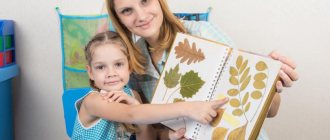Project on legal education of children “I am a child and have the right...”
One of the forms of work on the legal education of children in preschool educational institutions is the project method,
which allows combining the interests of all subjects of the preschool educational institution: children, parents, teachers, preschool educational institutions specialists, the social environment, while the efforts of adults should be aimed at creating conditions for the manifestation of children’s creativity, activities are organized in accordance with their interests, desires and needs, and parents have the opportunity to actively participate in the legal education of their children.
A long-term project on the legal education of children “I am a child and I have the right...”, which includes several co-projects: with young children “My Family”, middle age “What do our names mean”, the senior group “Friendly Children” and the preparatory group “Everyone” has the right to!".
The main idea of the project is the recognition of the child as a full-fledged and full-fledged person: free and responsible, knowing his rights and adequate ways of behavior in cases of their violation, having self-esteem and respecting other people. This project is a system of organizational and pedagogical activities and actions that ensure the integration of methods and forms of organizing legal education, which meets the Federal State Educational Standard for Preschool Education and is built on the principles of developmental education, scientific validity and practical applicability of the educational process of preschool educational institutions.
Expected results:
After the implementation of the project, children will know their rights (the right to life, name, family, freely express their views, the right to receive information and education, to use health care services) and responsibilities (to help adults, respect elders, etc.), will apply the acquired knowledge in practical activities - creative and educational games, will try to use this
This knowledge in communicating with other children will demonstrate the ability to reason, compare, draw conclusions about children’s rights, and will be ready to correctly evaluate themselves and others.
Practice-oriented project “Everyone has the right!”
(long-term, open), preparatory group, children 6-7 years old.
| Project topic | Legal education of older preschoolers |
| 1 | 2 |
| Direction | Social and personal |
| Name of the organization | Municipal budgetary preschool educational institution “Kindergarten No. 2 “Little Red Riding Hood” of a general developmental type with priority implementation of activities for the physical development of children, Lesnoy, Sverdlovsk region. |
| FULL NAME. author, position | Teachers: Komarova Natalya Viktorovna Cherezova Marina Vasilievna |
| Regulatory and legal framework of the project | Convention on the Rights of the Child Charter of MBDOU Regulatory and legal framework of a preschool educational institution. Collection of documents. |
Leisure scenario in the preparatory group “About the rights of the child - while playing”
Free time on legal topics in the preparatory group. Leisure scenario in the preparatory group “On the rights of a child - a game” with presentation.
Goal: To give children a general idea of their rights. Contribute to the development of legal worldview and moral ideas. Develop the ability to reason, compare, and draw conclusions. Develop self-esteem and respect for others. Material: Demonstration: A book with “Child Rights” written on the cover; character Baba Yaga; Baba Yaga's House (hut) paper flower “Children's Rights”; ball; musical accompaniment: audio recording of the voices of forest birds. Delivery: each child - a pillow - “thought”, didactic game “Everyone has rights”, “Name”, “Home”, “Treatment”, “Education”, “Love and care”. In the group room there is a place for outdoor games, where there is Baba Yaga’s house, covered with white fabric (pillows are placed in front of it, flowers are placed on the side). Teacher: I'm glad to meet you. Today we will get acquainted with a wonderful book. This is called “Children's Rights” (shows). This wonderful book will teach you about children's rights.
Baba Yaga appears. (can be a doll or an adult role)
Baba Yaga (takes a book from the teacher) Mala, you still have the right to study! And I read this book. (goes to the open play area, hides behind his hut). Teacher: Well, Baba Yaga! He took our book and he did it! What are we going to do now? (children's answers) Well, let's contact her and return our book. Children and teacher move to the open playground. Teacher (pointing to the house covered with a white cloth). Behind this snow-capped mountain in the forest lives Baba Yaga. It is difficult to overcome the mountain, but magical clouds will help us. (points to the pillows). Get in quickly and fly! (Children sit on the pillows) We will fly very fast, so close your eyes so they don’t get wet from the wind, let’s take off! Hold on to the clouds. Feel how fast we fly! The mountain is already behind us.
What else to read: Consultation for educators “Peculiarities of perception of the size of objects by preschool children,” teacher Manuilova L.M.
Includes a voice recorder with bird sounds. Slowly increasing the volume. Removes fabric from Baba Yaga's house. Educator. Can you hear? Birds are singing. We're flying into the forest. We open our eyes. We land in a clearing. Here is Baba Yaga's hut. (Children get up from the pillows and come home). In a deep forest there is a hut with chicken legs on the edge. It is located a stone's throw from the forest where Grandma Yaga lives. - Shall we knock? (Baba Yaga appears)
Baba Yaga: Who are they? Why did they come? I'm not expecting guests. Teacher (turns off the recorder). Oh Baba Yaga, how angry you are, what a rude voice you have and your hostile words. You even scared the birds with your scream. Baba Yaga. Stop talking! Why did you come? (Children's answers) Teacher: Yes, Baba Yaga, we came to pick up the book that you stole from us. Baba Yaga. He didn't steal anything from you, he just took it. You do not own the rights to this book. And only the children and grandchildren of the Tsar Sultan and the Nightingale the Thief can count on all the rights written in the book. And also children who believe in Baba Yaga and Koshchei the Immortal, and the same skin color as Baba Yaga, and in whom you believe. So, Baba Yaga, you are wrong, give us back the book! Baba Yaga. Oh oh! Gorgeous thing! Come on, come on! come here to me, you number one. Educator. Baba Yaga, why do you speak so strangely to children? After all, they have a name, each has its own. Baba Yaga: Names? Why give them names if the children are still small? They can handle the numbers too. Educator. Do you agree that all children are the same? (No) Prove it to Baba Yaga. (One child has black hair and blue eyes, he is tall and slow. The other child is blond, with brown eyes, with freckles. He is very cheerful and active. Etc.) Well, Baba Yaga, have we convinced you? Do you agree that every child has the right to his own name from the day he is born? Didactic game “Everyone has rights” Finger gymnastics “Lonely Grandma Yozhke” Lonely Grandma Yozhke. There's an owl and cats next to her, and she doesn't like chicken legs either. Everyone is afraid to meet her, they don’t want to sit in the oven. Grandma was wondering how to attract guests? She wouldn't like the devil and would go in for sports and invite her neighbors for tea and cake. And then the chicken legs danced on the path, and the owl and cats sang along with the guests. /TO. Strelnik / Baba Yaga: Well, I admit that you have the right to do so. Educator: Then let's introduce ourselves to Baba Yaga, and the echo will help us. Sitting game “Echo” Children stand in a circle, take turns saying their names and passing the ball to each other, the rest repeat them in chorus. Educator. And now, Baba Yaga, please return the book to us so that we can learn about the rights of other children. Baba Yaga: I will return it to you if your mother works for someone in the library. Teacher: And why? Baba Yaga: Since only the children of librarians have the right to read books, only the children of builders can live in houses, and the children of doctors are supervised. Teacher: Well, you said it! Children, do you think what Baba Yaga said is correct? (Children's answers). Baba Yaga, every child has the right to a home, food, care and education. (Hand out tokens - symbols “Home”, “Treatment”, “Education”, Baba Yaga goes to her home)
What else to read: Word game Crocodile: game rules, board review or how to play
Educator: For some reason I felt sorry for Baba Yaga. Maybe she does bad things because no one loves her, no one cares about her. After all, everyone has the right to love and care. You all have the right to this. No one even wished Baba Yaga a happy birthday. Let's do it. We collect the flower by petals and give it to him as a gift. Outdoor game “Collect a flower”
They collect flowers and knock on the door of the hut. Baba Yaga comes out. The children congratulate her on her birthday and give her flowers. Baba Yaga is embarrassed, thank you, Teacher. it's time for us to return. Ride your clouds and fly home. Baba Yaga: Wait! Get your book. I am also capable of good deeds.
Educator: Thank you, Baba Yaga. Come. We have many other interesting books and games. Until we meet again! Baba Yaga. Until we meet again! Thank you for the invitation, I will definitely come. Educator. Everything is fine? Let's fly! Don't forget to close your eyes.
(Turns on a tape recorder with a recording of bird voices, throws a rag over Baba Yaga’s house. Baba Yaga leaves.) Did you like the trip? What did you like most? (Children's answers). What rights did you learn about your rights today? (Children’s token responses are symbols)
Well done, remember your rights. We will meet again in this book, which will introduce you to other rights. Thank you all. It was very pleasant and interesting for me to be with you.
Didactic game “Chain of rights of the child”
Goal: to strengthen children's knowledge about the rights of a small child. Improve your reading skills. Develop fine motor skills of your hands. Cultivate attention and visual perception.
Material: parts of the “chain”: some are a graphic representation of the rights of the child, others are a verbal explanation of the graphic images.
Rules of the game: to verbally explain the rights of the child, children choose pictures with graphic images, explaining their content, forming a chain. Vice versa.
Game progress:
Option 1
The provider or child reads a verbal explanation of the child's rights to parts of the chain. Children find suitable graphics, connect them with a cable and talk about the child’s right that is depicted on it.
What else to read: Role-playing games for preschool children
option 2:
Children choose for themselves parts with a graphic representation of the rights of the child and, with the help of the teacher, or independently find the appropriate verbal explanation. And they are connected with a cord. The one who connects the chain the fastest wins.

